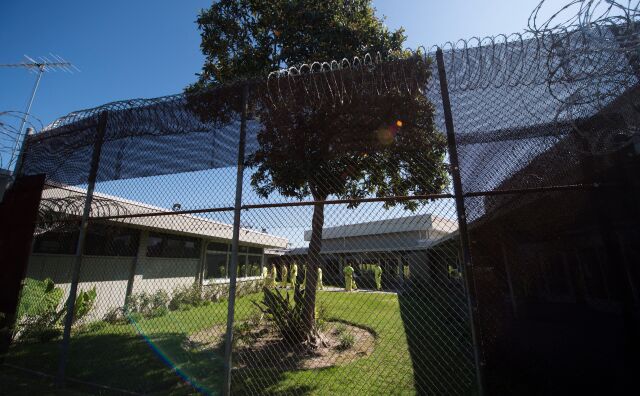CA Bill Aims To Release Severely Ill Patients From Prisons Vs. Parole In Nursing Homes

-
AB 960 passed and was signed into law on Sep. 29, 2022. Read more >>
A state lawmaker has dropped an effort to expand a program that releases people who are “permanently medically incapacitated” from prison and places them in nursing homes after discovering the program is not aligning with federal guidelines for patient rights.
Instead, the bill, AB 960, has been amended to focus on another program called compassionate release, which allows for someone to have their sentence recalled and be released from the system entirely.
The pivot comes after an LAist investigation revealed that the California Department of Corrections and Rehabilitation moved almost all of its patients on its medical parole program from nursing facilities across the state to a decertified one in the San Fernando Valley. Patients said they were not warned, and were pulled far away from their families.
The investigation found that the facility, Golden Legacy Care Center, had a long history of violating federal standards of care, including cuffing a patient to his bed. The federal agency that oversees nursing homes revoked its certification in December. Then, CDCR entered a direct contract with the facility and moved patients there because it maintained that it needed the ability to enforce restrictions that federal regulations do not allow, such as limiting visitors and restricting people from leaving.
-
At magnitude 7.2, buildings collapsed
-
Now spinning in front of Santa Monica apartments
-
Advocates seek end to new LAUSD location policy
Assembly member Phil Ting (D-San Francisco), took the lead of AB 960 in 2021, hoping to help more people qualify for the program. Ting amended it after LAist revealed sweeping changes to the program.
“We were really disappointed,” Ting said. “When you have inmates by their very nature, who are either terminally ill, or they need full time medical care or a high level of medical care, it's just very difficult to imagine them being dangerous at all. Those are exactly the kind of people that we need to get out of a prison setting into more of a lower security, medical setting.”
Incarcerated people can be eligible for compassionate release if they are “terminally ill with an incurable condition caused by an illness or disease that would produce death within 12 months” or require “24-hour total care,” for reasons like being in a coma or persistent vegetative state. Ting’s legislation would replace the language to include incarcerated people who have a disease or condition with an “end-of-life trajectory,” are unable to complete one or more basic activities of daily living, or have “progressive dementia or related cognitive impairment.”
The bill would also eliminate one of several steps applicants need for approval — a requirement that the Secretary of CDCR make recommendations before cases head to the court that issued their sentence for a final decision.
Waiting For A Decision
According to analysis by FAMM, a group that advocates for criminal justice reform, only 53 of 304 people who applied for compassionate release between January 2015 and April 2021 were released, while 91 died waiting.
Ting’s office said that some people who are currently on medical parole and at Golden Legacy would be able to qualify for compassionate release depending on their medical history because some of the requirements for the programs would overlap.
“We tried to figure out if there was something we could do with this population — the population who require a high level of medical care, are pretty much incapacitated and should not really need to be in a prison setting and really pose no risk to anybody,” Ting said.
The bill is expected to be heard in the State Senate Appropriation Committee next week.
The LAist investigation found that it is rare for a nursing home to lose its federal certification, and experts say when that happens, the state licensing agency also starts to move in that direction. Golden Legacy still remains licensed by the California Department of Public Health, which said, “[it can still provide health care that meets state licensing standards.”
“In the case of Golden Legacy, deficiencies identified by CDPH over its quality of health care were resolved and corrected,” said a CDPH spokesperson by email.
As of late July, 44 people were on medical parole, down from 53 in early May. Vicky Waters, a spokesperson for CDCR, said the number of people can fluctuate for a variety of reasons, “including people releasing from custody or recovering enough to no longer need to be at an outside medical facility.”
-
In December 2020, Sadie and Eddie Martinez were falsely accused of attempted kidnapping by a white woman who had been shopping at a Michaels craft store at the same time as them. This is the story of Sadie's fight to clear their names and bring her accuser to justice.
-
An Orange County public defender has tallied 57 tainted criminal cases stemming from the county's informant scandal. New revelations of alleged misconduct could affect dozens more.
-
Ryan Clinkunbroomer was found in his patrol car near the Palmdale station. He was a third-generation sheriff's deputy.
-
L.A. County prosecutors say David Bloom scammed nine people out of nearly $250,000. Bloom, a twice-convicted con man known in the ‘80s as the “Wall Street Whiz Kid,” allegedly trolled for victims in a Hollywood apartment building and local bars.
-
Edward Bronstein died in March 2020 while officers were forcibly taking a blood sample after his detention.
-









